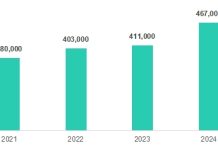Amid the tech sector’s challenging start to 2023, marked by economic downturns and cost-cutting measures, a resurgence of confidence has been spurred by strategies focusing on generative artificial intelligence (GenAI).
GenAI integration has emerged as the leading opportunity in EY’s 2024 ranking of top prospects for technology companies. The report outlines ten key opportunities for the year ahead, including injecting GenAI into digital transformation strategies and experimenting with it in targeted front- and back-office use cases.
This shift towards GenAI reflects a broader trend in the industry, where companies are increasingly recognizing the transformative potential of artificial intelligence to drive innovation, efficiency, and competitive advantage.
With GenAI at the forefront of digital transformation strategies, organizations are poised to unlock new levels of productivity and agility, propelling them ahead in a rapidly evolving market landscape.
While recognising the immense potential of GenAI, the report also cautions that the majority of organisations are still in the early stages of AI maturity, urging companies to establish an “AI control tower” to ensure safe and ethical AI deployments.
This emphasis on responsible AI adoption underscores the importance of aligning technological advancement with ethical considerations and human values, thereby fostering trust and mitigating potential risks associated with AI implementation.
Ken Englund, EY Americas TMT Leader, emphasised the pivotal role of AI in reshaping business strategies for future success. He highlighted the need for organisations to embrace AI as a central component of their operations, not only to accelerate their transformation journeys but also to capitalize on rapidly emerging technologies and business models.
By leveraging AI effectively, technology companies can position themselves as leaders in innovation and drive sustainable growth in a competitive global market.
Additionally, Joongshik Wang, EY Asean Technology Leader, noted a shortage of skilled GenAI talent across Southeast Asia, underscoring the need for investment in training and organizational commitment.
In order to fully realise the benefits of GenAI, companies must prioritise talent development and foster a culture of continuous learning and innovation. This includes investing in reskilling programs and creating pathways for employees to acquire the necessary skills to harness the power of AI effectively.
The report also highlights the importance of shaping corporate investment strategies around the AI roadmap and diversifying supply chains in emerging markets.
In an era of increasing geopolitical uncertainty and supply chain disruptions, companies must adapt their strategies to mitigate risks and capitalise on emerging opportunities in new markets.
By establishing additional supply chains in regions such as India and Southeast Asia, companies can diversify their operations and reduce their dependence on traditional supply chain networks that may be vulnerable to geopolitical tensions and trade conflicts.
To address the growing demand for GenAI, Olivier Wolf, EY-Parthenon Global TMT Leader, observes the emergence of talent ecosystems across Southeast Asia, facilitating investment, recruitment, and training.
These ecosystems bring together technology companies and professional services organizations to collaborate on talent development initiatives, enabling companies to access a pool of skilled professionals and scale their operations more effectively. By leveraging these talent ecosystems, companies can overcome the challenge of talent shortages and accelerate their AI adoption efforts.
Furthermore, prioritising energy efficiency in data centers and establishing additional supply chains in emerging markets are identified as critical priorities for technology companies in 2024.
As the demand for AI and data-driven technologies continues to grow, so too does the energy consumption of data centers required to support these technologies. By prioritizing energy efficiency measures, companies can reduce their environmental footprint and operating costs, while also ensuring the sustainability of their operations in the long term.
In conclusion, the rise of GenAI represents a transformative opportunity for technology companies to drive innovation, efficiency, and growth in an increasingly digital world.
By embracing AI as a central component of their strategies and investing in talent development, companies can unlock new levels of productivity and competitiveness, while also addressing ethical considerations and sustainability concerns.
As technology continues to evolve at a rapid pace, companies that successfully harness the power of AI will be best positioned to thrive in the digital economy of the future.















